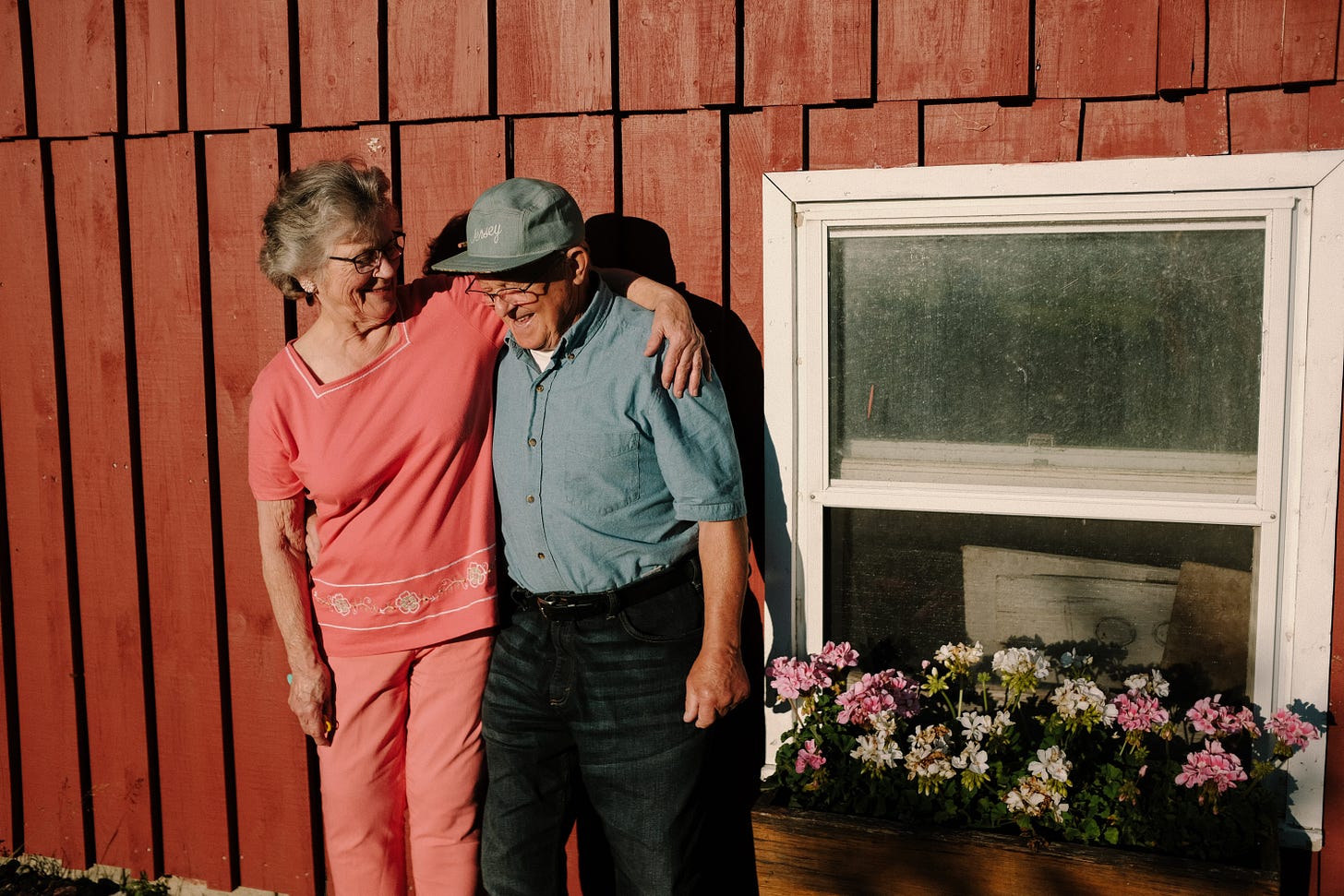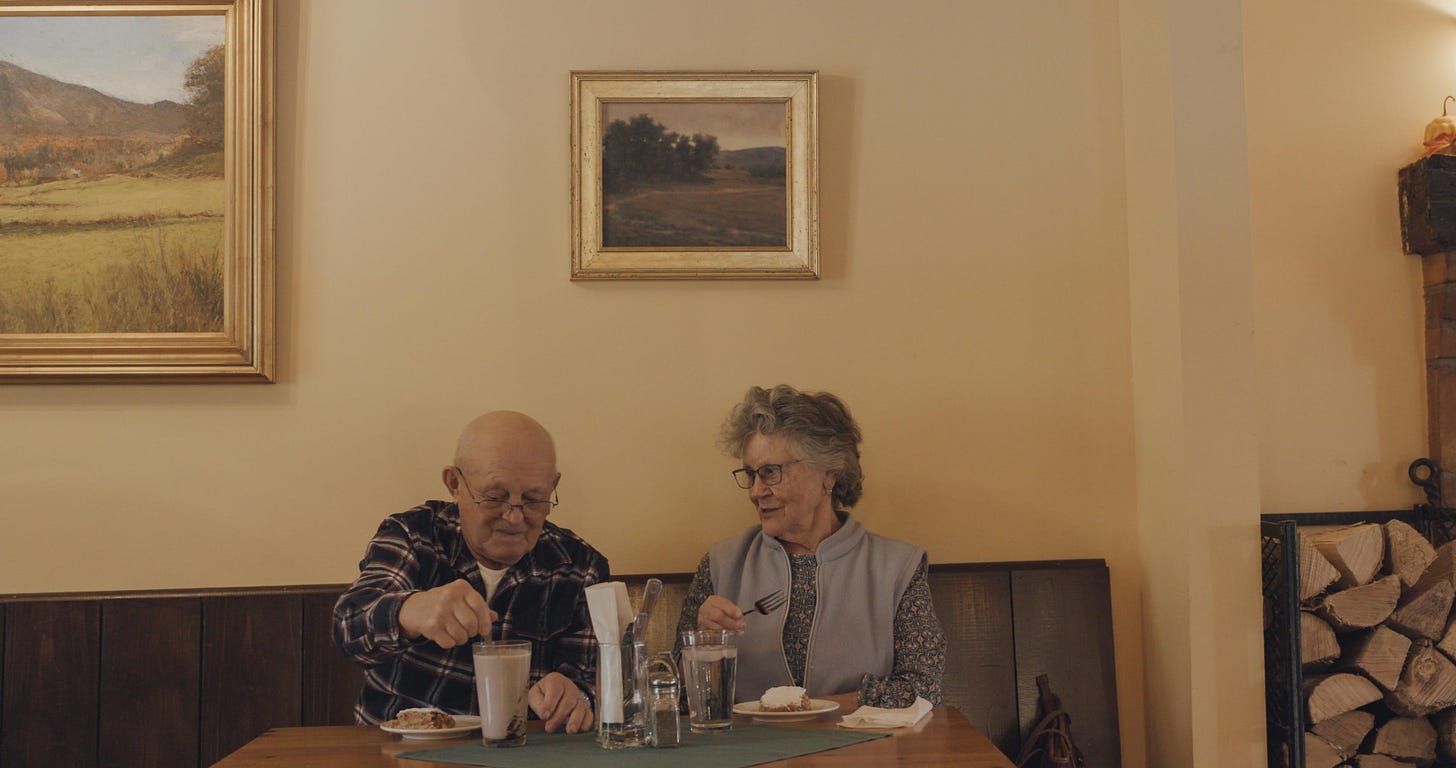In Memory of David Isham
A Quiet Strength Rooted in Love and Vermont Soil
This week, David Isham of Williston, Vermont, passed away, leaving behind his wife, Ginger, after 65 years of marriage. I am heartbroken for Ginger and their family, but I am also deeply grateful to have had the chance to know and document David during the filming of the Netflix series My Love in 2019. David was a man who left an indelible mark, not through loud declarations or performances, but through quiet strength, intentional living, and a deep love for his family and land.
David was a dream documentary participant—not because he was eager to be on center stage (he wasn’t) or because he performed for us (he didn’t). Instead, David brought his authentic self. He had no interest in playing a role or speeding up his life to match the pace of filmmaking. Instead, he invited us to slow down, to witness the beauty of his life as it unfolded naturally: tapping maple trees during sugaring season, walking among the fall colors with Ginger, and resting in his favorite recliner. Through his steady presence, we found poetry in the everyday.
David had a routine that anchored him. He loved working with his hands—shoveling snow, picking corn and strawberries, mowing the grass, vacuuming the house, or tending to the sugar bush where he planned for his ashes to be scattered. “I grew up right there. It’s a wonderful view,” he said to the man at the funeral home during filming, with his quiet, accidental poetry. That view from the sugar bush, the same one he had cherished his entire life, will now hold his spirit.
David’s life was a testament to the power of paying attention. When he spoke, it was often in bursts of unexpected wisdom—like a folkloric saying that had been passed down through generations: “When the wind’s in the west, the sap flows best.” He knew the rhythms of the natural world, not from books but from years of farming, of being part of the land he loved so deeply. His Vermont accent carried a melody that made his words feel timeless as if they belonged to both his ancestors and to the trees themselves.
While David was quiet, he wasn’t without humor or spontaneity. He had a playful side, breaking out into song when the mood struck him—moments Molly, Billy, and I scrambled to capture with our cameras. His laughter and dry wit cut through the noise of the world. At a crowded senior expo, surrounded by vendors selling products and overpriced senior living to the elderly, he joked, “I can’t afford to live there though,” letting out a chuckle that made everyone feel at ease. He had a way of finding peace in chaos, of grounding himself and those around him.
David and Ginger’s partnership was something to behold—a true balance of opposites. Ginger is the talkative one, always ready to share her thoughts, while David balanced her energy with his quiet, steady presence. Together, they created a rhythm that worked, respecting and appreciating their differences. Ginger often said she admired David’s quiet strength, a trait that shone through in everything he did. They gave each other space to be themselves—David solving puzzles in the living room while Ginger swam laps at the local fitness center—but always came back together, hand in hand, on the loveseat in their small, cozy apartment.
Their love was rooted in tradition but flexible enough to adapt to change. They carried forward rituals like singing sugaring songs that they had sung for 50 years, but they also embraced new experiences and new ways of thinking. They proved that a life doesn’t need to be extravagant to be rich in meaning. As Ginger often said, “We just need good health!” Good health gave them the gift of simple joys—like potlucks with family, walking through the woods near their home, searching for trilliums and other spring ephemerals.
David’s life was intertwined with the land and history of Vermont. He was born in the very home where he passed away—a detail that feels almost mythic, like something out of a Wendell Berry poem. The farm he called home had been in his family for five generations, a legacy he cherished and nurtured. While changes in the dairy industry forced him away from the cows he loved, he adapted and supported his son, Mike, and the next generation as they found other ways of stewarding the land. He faced these shifts without bitterness, knowing he was part of a larger story, one that transcended his own lifetime.
He was humble, rooted, and resilient. He was proud of what he had built, of his children and grandchildren, of the farm that remained a gathering place for his family and community. But he was never boastful. He respected others and accepted their choices without judgment, even if they were different from his own. He had a go-with-the-flow demeanor that made him a steadying force in an ever-changing world.
David Isham’s life was a quiet poem—a series of small, meaningful acts that added up to something extraordinary. He taught me the value of slowing down, of observing, of truly listening. Through him, I learned that a partnership doesn’t need to be loud or dramatic to be strong. It just needs to be rooted in love, mutual respect, and a shared sense of purpose.
To Ginger, his children, and grandchildren: thank you for sharing David with us. His presence enriched my life and the lives of everyone who had the privilege of knowing him, even briefly.
If you’d like to spend time with David and Ginger, you can watch their story in the My Love series on Netflix. I hope it inspires you to cherish the quiet moments, the enduring partnerships, and the landscapes that shape us.
Rest in peace, David. You will be deeply missed.
What Documentary Filmmakers Can Learn from David Isham:
Spend Time Before Filming
Get to know potential participants as people first. Trust is essential, and you’ll need to earn it before the camera even comes out.
Embrace the Quiet Ones
It’s easy to gravitate toward people who are naturally charismatic or talkative, but don’t overlook those with a quiet strength. Sometimes the most profound moments come from stillness, reflection, and intentionality.
Look for a Sense of Place
Seek characters deeply connected to their surroundings—whether it’s a rural farm, an urban neighborhood, or a specific community. A strong sense of place can act as another character in your film.
Trust the Moments, Not the Words
Don’t just look for someone who can narrate their life or explain their emotions. Instead, focus on people whose actions and routines naturally reveal their story.
Balance Contrasting Personalities
If you’re documenting a couple, a family, or a group, look for contrasting personalities that complement one another. Conflict isn’t always necessary—sometimes balance can be just as compelling.
Be Patient
Slower-paced characters like David might require you to adapt your process. Be willing to linger in their world, and resist the urge to rush them into delivering “soundbites.” Let the magic happen in its own time.
Respect Boundaries
Your participants are human beings, not subjects. Make sure they feel valued beyond what they can offer to your project. The best relationships between filmmakers and participants are built on mutual respect and trust.
Celebrate the Ordinary
The best stories aren’t always in the dramatic or extraordinary. Life’s small, everyday moments—like making a puzzle, walking through the woods, or holding hands on the loveseat—can carry the greatest emotional weight.








I'm sorry for your loss, Elaine. I really enjoyed getting to know him through your work.